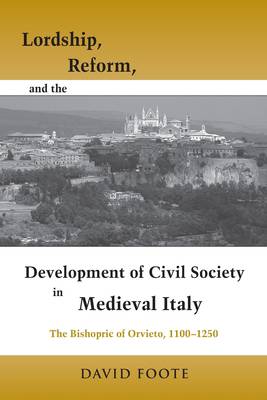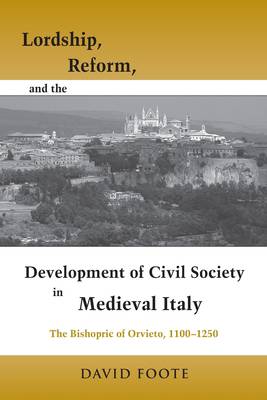
- Retrait gratuit dans votre magasin Club
- 7.000.000 titres dans notre catalogue
- Payer en toute sécurité
- Toujours un magasin près de chez vous
- Retrait gratuit dans votre magasin Club
- 7.000.0000 titres dans notre catalogue
- Payer en toute sécurité
- Toujours un magasin près de chez vous
Lordship, Reform, and the Development of Civil Society in Medieval Italy
The Bishopric of Orvieto, 1100-1250
David FooteDescription
In his examination of the bishopric of Orvieto from 1100 to 1250, David Foote reveals how three defining developments of the High Middle Ages--the feudal revolution, ecclesiastical reform, and state building--played out in a typical medieval Italian commune. He challenges scholarship that overemphasizes the secular nature of Italian city-states by showing the extent to which developments in ecclesiastical institutions provided a model for the formation of civic institutions and defined a commune's political and religious culture.
Following the collapse of Carolingian authority in the tenth century, Italy experienced a period of political chaos. Rural lords, unrestrained by central authority, fought to dominate the countryside. Bishoprics, by virtue of their temporal and spiritual authority over dioceses, emerged in the midst of this disorder as the most effective institutions for rebuilding political authority at the local level. The Orvietan bishopric formed the center of an urban coalition attempting to conquer and pacify their contado, or surrounding countryside. Orvieto's bishopric assisted the early city-state in administering its territory by developing innovative methods of written administration and record keeping.
As the center of a wide range of religious interests, the bishopric was often caught between competing political and religious actors who leveraged their interests through ecclesiastical institutions and resources. This interaction had a profound effect on the city's political and religious culture. As Orvietans struggled to define the norms that would govern their society, they had to adapt their quest for political power and autonomy to their religious values.
David Foote's deeply researched new book illuminates the process of state building in its early stages and the formation of political and religious culture in Europe during the High Middle Ages.
Spécifications
Parties prenantes
- Auteur(s) :
- Editeur:
Contenu
- Nombre de pages :
- 272
- Langue:
- Anglais
- Collection :
Caractéristiques
- EAN:
- 9780268028725
- Date de parution :
- 31-12-04
- Format:
- Livre broché
- Format numérique:
- Trade paperback (VS)
- Dimensions :
- 139 mm x 206 mm
- Poids :
- 403 g

Les avis
Nous publions uniquement les avis qui respectent les conditions requises. Consultez nos conditions pour les avis.






